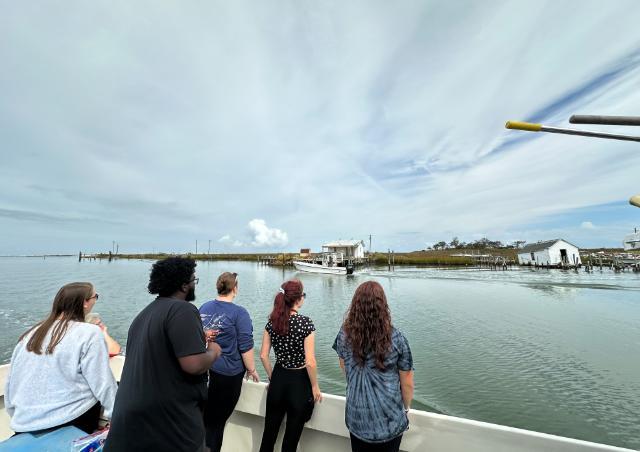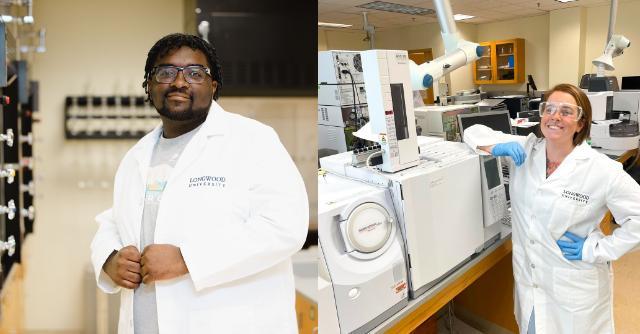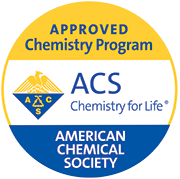Chemistry Courses
CHEM111. Fundamentals of Chemistry I
An introduction to the fundamental principles of chemistry that provides a foundation for further study in the sciences by examining the structure of matter, chemical bonding, reactivity, and the role of energy in chemical reactions. The laboratory component of this course focuses on scientific inquiry. The importance of chemistry and scientific reasoning in everyday life is also emphasized. A C- or better in this course is a prerequisite for CHEM 112 and CHEM 211. 4 credits. FSRC, WI.
CHEM112. Fundamentals of Chemistry II
A continuation of the study of fundamental principles of chemistry. Topics include gases, reaction rates, aqueous equilibria, thermodynamics, and electrochemistry. 3 lecture, one 2-hour lab periods. Prerequisite: CHEM 111 with a grade of C- or higher. 4 credits.
CHEM113. Chemistry Recitation I
An introduction and survey of career opportunities in chemistry and biochemistry. Discussions may include different industry and academic careers, graduate programs, the nature of research, developing practical skills for success in college, and a review of important topics covered in CHEM 111. Open to chemistry majors only. Co-requisite: CHEM 111. One 1-hour lecture. 1 credit.
CHEM1SR. Chemistry SR Transfer Pillar
Chemistry SR Pillar Course
CHEM1XX. Chemistry Elective
CHEM211. Organic Chemistry I
An introduction to the structures and reactivities of carbon-based compounds. Topics include different theories of bonding, structural analysis, energy changes and stability, reaction rates, and reaction mechanisms. The principles of chemical synthesis are also introduced. A one-credit laboratory class (CHEM 213) is also required to complete the organic chemistry requirement. Prerequisite: CHEM 111 with a grade of C- or higher. 3 credits.
CHEM212. Organic Chemistry II
A continuation of the study of carbon-based compounds, with an emphasis on developing a mechanistic understanding of their reactions. The principles of chemical synthesis used to manipulate and transform substances are also emphasized. A one-credit laboratory class (CHEM 214) is also required to complete the organic chemistry requirement. Prerequisite: CHEM 211 with grade of C- or higher. 3 credits.
CHEM213. Organic Chemistry Lab I
An introduction to the practical methods used to synthesize, purify, and characterize carbon-based compounds. The proper use of standard laboratory equipment and instrumentation is also emphasized. Prerequisite/Corequisite: Prerequisite or may be taken concurrently: CHEM 211. 1 credit.
CHEM214. Organic Chemistry Lab II
A continuation of the study of the practical methods used to synthesize, purify, and characterize carbon-based compounds within a multi-step chemical synthesis. The use of different instrumental methods to elucidate molecular structure are strongly emphasized. Prerequisite: CHEM 213 Prerequisite/Corequisite: CHEM 212. 1 credit.
CHEM215. Organic Chemistry Recitation
A review of important introductory concepts in organic chemistry. Students participate in problem-based activities designed to enhance their mastery of topics introduced concurrently in CHEM 211. In addition, more advanced topics in preparation for future studies in organic chemistry are also introduced. Co-requisite CHEM 211. 1 credit.
CHEM295. Special Topics in Chemistry
Specialized courses on a variety of topics that may be offered periodically. 1-4 credits.
CHEM2XX. Chemistry Elective
CHEM301. Applying Chemistry to Society
An introduction to fundamental chemical principles and how they can be applied to modern societal issues such as climate change, alternative energy, clean water access, recycling, food production, and drugs. These topics are investigated through various scientific, political, economic, and socio-cultural lenses to learn how science informs public policy. Designed for students with no previous education in chemistry. Pre-requisite: Completion of FSRC pillar. 3 credits.
CHEM305. Chemistry at War
A study of the scientific basis for weapons and other technological applications used in war throughout history. Fundamental chemical principles relating to weapons and the contributions of important scientists are included. 3 credits.
CHEM311. Drug Addiction and Recovery
An introduction to the structure–activity relationships of small molecules and how these properties can lead to physical dependence. Larger psychological and sociological concerns associated with addiction, relapse, and recovery programs are also discussed. Students have the opportunity to analyze statistical and scientific data from various fields to drive an integrative approach aimed at improving community health. Pre-Requisite: Completion of FSRC Pillar course. 3 credits.
CHEM372. Environmental Chemistry
An introduction to the chemical processes and properties that underlie current environmental issues. Topics may include atmospheric, aquatic, and soil chemistry. Pre-requisite: CHEM 331. 3 credits.
CHEM375. Polymer Chemistry
A study of the structures, properties, and physical forms of polymers. Bulk macroscopic properties and real-world applications are also discussed, along with characterization methods. Prerequisite: CHEM 212. 3 credits.
CHEM376. An Intro to Medicinal Chem
An introduction to the chemical structures and properties of drugs with an emphasis on how drug molecules interact with cellular machinery. The principles and processes of drug design, including how they are approved and brought to market, are also discussed. Pre-requisite: CHEM 212 with grade of C- or better. 3 credits.
CHEM376. An Intro to Medicinal Chem
An introduction to the chemical structures and properties of drugs with an emphasis on how drug molecules interact with cellular machinery. The principles and processes of drug design, including how they are approved and brought to market, are also discussed. Pre-requisite: CHEM 212 with grade of C- or better. 3 credits.
CHEM390. Direct or Independent Study
Must be approved by the head of the department. May be repeated as 391. 1-18 credits.
CHEM392. Internship in Chemistry
A semester-long, on-the-job learning experience designed to apply the principles of chemistry. 1-15 credits
CHEM3XX. Chemistry Elective
CHEM412. Biochemistry I
A study of the chemistry of proteins, carbohydrates, lipids, and nucleic acids in biological systems. Prerequisites: CHEM 112 and CHEM 212 (with a minimum grade of "C-" in both courses. 3 lecture hours and one 3-hour lab period. 4 credits.
CHEM413. Biochemistry II
An in-depth, systematic study of the metabolic processes carried out in living cells. Topics include the central energy conversion pathways, photosynthesis and carbon fixation, carbohydrate synthesis, and other major biomolecule synthesis pathways, and their regulation by cells. The roles of metals and the metabolic transformations of disease are also emphasized. Pre-requisites: CHEM 412 or BIOL 412, with a minimum grade of C-. 3 credits.
CHEM490. Directed or Independent Study
Must be approved by the head of the department. May be repeated. 1-18 credits.
CHEM492. Internship in Chemistry
A semester long, on-the-job learning experience designed to apply the principles of chemistry. 1-15 credits.
CHEM495. Special Topics in Chemistry
Specialized courses on a variety of topics that may be offered periodically. 1-4 credits.
CHEM496. Research Projects in Chemistry
Students will carry out research projects under individual supervision of an instructor. The nature of the project will depend on the interest and needs of the student. Consent of the instructor and approval of the department head are prerequisites for enrollment. May be repeated. One 3 hour lab period per credit. 1-4 credits.
CHEM498. Senior Thesis in Chemistry
Students conduct an in-depth project in chemistry under the direction of a faculty member and the Longwood Senior Thesis Committee. May be repeated as 499. 3 credits.
CHEM499. Senior Thesis in Chemistry
Students conduct an in-depth project in chemistry under the direction of a faculty member and the Longwood Senior Thesis Committee. 3 credits.




